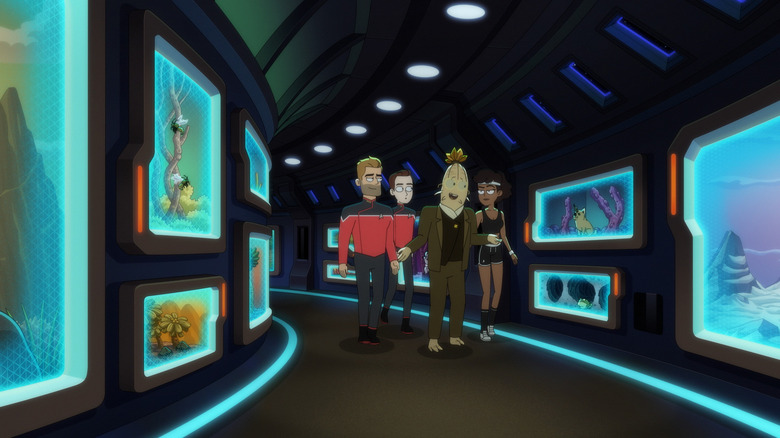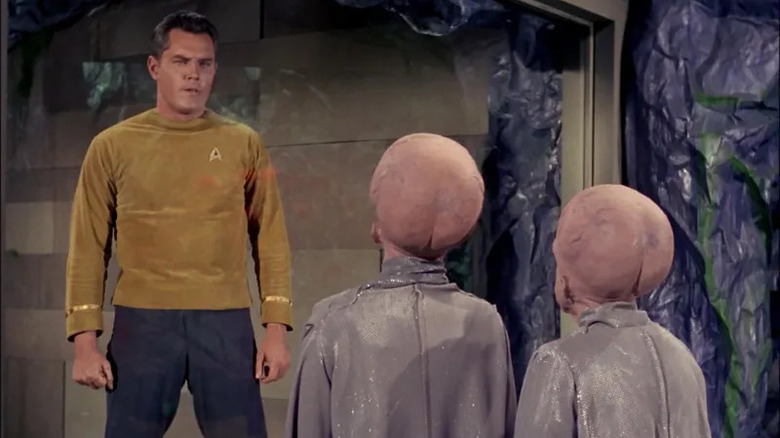Lower Decks Season 4 Pays Hilarious Tribute To Star Trek's Original Pilot
This article contains spoilers for "Star Trek: Lower Decks" season 4, episode 2.
"Star Trek: Lower Decks" season 4, episode 2 is called "I Have No Bones Yet I Must Flee," which is a reference to the 1967 Harlan Ellison short story "I Have No Mouth, and I Must Scream." The plot, however, is an amusing reference to the original "Star Trek" pilot episode "The Cage." Although footage from "The Cage" was eventually repurposed into a two-part 1966 episode called "The Menagerie," the notable "Star Trek" pilot wasn't aired on TV in its uncut form until 1988.
The plot of "The Cage," for the uninitiated, took the Enterprise to the planet of Talos IV. There, Captain Pike (Jeffrey Hunter) was kidnapped by the large-headed, psychic Talosians. The aliens didn't understand human emotions and projected fantasies into his head to test out feelings of fear, lust, and anger. Pike found that he could resist their psychic attacks by projecting rage into their heads. "The Cage" was rejected by NBC because it was deemed, according to William Shatner, too cerebral and lacking action.
The idea of a human being held in captivity in an alien zoo, however, is a common sci-fi trope that "Lower Decks" is now taking the opportunity to riff upon. It was a concept recently seen in an episode of "Futurama," as well as in an early episode of "The Orville." Why shouldn't "Trek" follow suit?
"I Have No Bones Yet I Must Flee" sees the U.S.S. Cerritos called to a distant menagerie overseen by a tuber-like being in glasses. It seems the friendly radish man has captured a pair of humans for one of his displays, and the Federation has been contacted to free them.
Mariner (Tawny Newsome) uses the word "menagerie" a bunch. That's definitely on purpose.
The Menagerie
There has long been some niggling debate among Trekkies as to how many episodes of the original series there actually are. "The Cage" refer to itself as an episode of "Star Trek," and it exists in the same continuity, but it wasn't part of the official "Star Trek" canon for decades. My heart says it should be included.
There is also some debate as to whether or not "The Menagerie" counts as one episode or two. It originally aired as two separate episodes in two separate weeks in 1966, but the bulk of "The Menagerie" consisted of old footage from "The Cage." If one does count "The Cage," however, surely "The Menagerie" counts only as a single episode, then. "The Menagerie" consists of so little original footage, that some nitpickers feel that it only contains one episode's worth of new material. If one counts them all, there are 80 episodes of "Star Trek."
Yes, these are the kinds of debates Trekkies have when you're busy enjoying good food, conversing, having sex, and reading long books. So "The Menagerie" carries with it a distant whiff of controversy. When Beckett Mariner uses the word "menagerie" repeatedly in "I Have No Bones," it's pinging Trekkies' radars. We know, Mariner. We know what that word means.
In a cute additional gag, it's implied that rescuing humans from alien zoos is a casual, common occurrence in "Star Trek." Mariner seems to have done this several times in the past, and notes that it's usually all based on a simple misunderstanding. Have you been kidnapped and placed in an artificial extraterrestrial biome for reasons of study or xenotourism? The Federation will come by to rescue you soon enough. This kind of s*** happens all the time.

